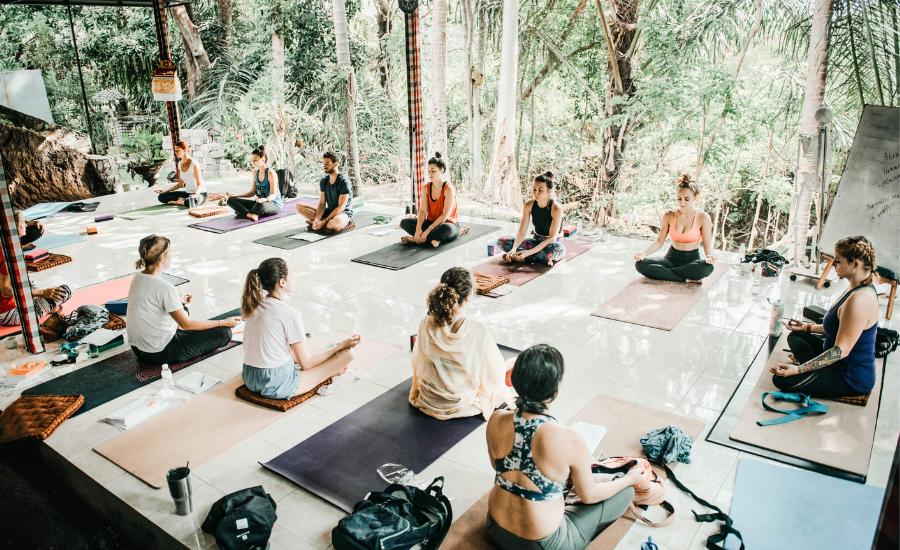Introduction
Yoga has spread worldwide, attracting practitioners from all over. Bali is a top yoga destination for self-discovery and deep yoga education. Bali is a beautiful place for Yoga Teacher Training Bali (YTT), and this article will investigate its transforming benefits for aspiring yoga instructors.
The Allure of Bali as a Yoga Destination
Bali attracts visitors with its stunning scenery, lively culture, and peaceful ambiance that invites spiritual inquiry. The island’s beautiful landscapes, stunning beaches, and calm temples are ideal for yoga teacher training. Students can study and practise yoga in the natural beauty and spiritual energy here.
Choosing Bali for Your Yoga Teacher Training
Location for your YTT depends on numerous things. Bali caters to yoga enthusiasts with its unique blend of tradition and modernity. Some compelling reasons to train as a yoga teacher in Bali:
- Variety of Yoga Schools: Bali has many yoga schools and retreat centres, each with its own style. You can choose a programme that suits your needs due to this diversity.
- Experienced Instructors: Bali is home to many famous yoga instructors and gurus. You can get world-class training and instruction.
- Spiritual milieu: Bali’s temples, ceremonies, and rituals provide a spiritual milieu that enhances yoga practise and comprehension.
- Affordable Living: Bali’s low cost of living makes YTT programmes more affordable. Most accommodations, food, and transportation are cheap.
- International Community: Bali’s diversified and supportive yoga community is international. This multicultural setting enhances learning.
Yoga Teacher Training Programs in Bali
Bali has many YTT programmes for different yoga levels and styles. You can find a programme for beginners or advanced yogis. Popular YTT programmes in Bali:
- 200-Hour YTT: This base programme covers asana, anatomy, philosophy, and instruction. It helps you teach yoga confidently.
- 300-Hour YTT: Advanced vinyasa, hatha, and yin yoga instruction is available after 300 hours.
- Specialized YTT: Prenatal yoga teacher training, yin yoga, and yoga therapy are available in Bali. These programmes let you study yoga in depth.
- Retreat-Style YTT: Some Bali YTT programmes immerse students in a yogic lifestyle for the duration of the course.
Immersion in Balinese Culture
Yoga teacher training in Bali offers a unique chance to experience Balinese culture. Bali has rich dance, music, art, and spiritual traditions. You can experience these cultural components during YTT:
- Balinese Ceremonies: Attend temple visits, blessings, and cultural performances.
- Arts and Craft: Discover Balinese dance, batik, and wood carving.
- Balinese Cuisine: Enjoy Balinese cuisine’s spicy, veggie, and rice dishes. You can also learn Balinese cooking.
- Local Community Engagement: Many Bali YTT programmes invite students to volunteer or work in the community.
Finding Inner Peace and Spiritual Growth
YTT in Bali offers spiritual growth and deep transformation beyond yoga practices. The island’s spiritual force and diligent practise and study can yield these benefits:
- Self-Discovery: Bali’s tranquility lets you explore your thoughts, feelings, and life purpose.
- Mindfulness and Meditation: Bali’s spirituality encourages mindfulness and meditation, which improves mental clarity and calm.
- Nature Connection: The island’s natural splendor fosters a sense of oneness with the Earth.
- Spiritual Guidance: Bali has many spiritual masters and gurus who can advise on yoga’s spirituality.
Yoga Philosophy and History
Balinese YTTs frequently study yoga philosophy and history extensively. This training helps you grasp yoga’s roots and concepts. Topics may include:
- Yoga Sutras: Patanjali’s eight limbs, ethics, and meditation.
- Bhagavad Gita: Studying this ancient scripture to grasp dharma, self-realization, and the divine.
- Yoga History: Studying yoga’s development from ancient to modern times.
- Anatomy and Physiology: How yoga postures affect physical health and mechanics.
Balancing Practice and Theory
YTT programs in Bali strike a balance between practical yoga sessions and theoretical knowledge. This holistic approach ensures that students are well-prepared to teach yoga effectively. Typical elements of a YTT program include:
- Asana Practice: Daily yoga sessions to refine your own practice and build strength and flexibility.
- Teaching Methodology: Learning how to sequence classes, instruct students, and provide adjustments and modifications.
- Anatomy and Physiology: Understanding the physical and energetic aspects of the body, as they relate to yoga.
- Philosophy and Ethics: Exploring the philosophical underpinnings of yoga and the ethical responsibilities of a yoga teacher.
- Teaching Practice: Gaining hands-on experience by teaching fellow students and receiving constructive feedback.
Certification and Accreditation
Upon successful completion of a YTT program in Bali, you will receive a certification that qualifies you to teach yoga internationally. It’s essential to choose a program accredited by reputable yoga organizations such as Yoga Alliance. Bali’s YTT programs are often recognized and accredited, ensuring the quality and authenticity of your training.
Conclusion:
Yoga teacher training in Bali is more than simply a certification—it may change your life. Bali’s natural beauty, spiritual energy, and rich culture foster personal and professional growth. Bali is an unforgettable place to teach yoga, deepen your practice, or find inner serenity. Explore Bali and discover yourself via yoga teacher training. Namaste!
